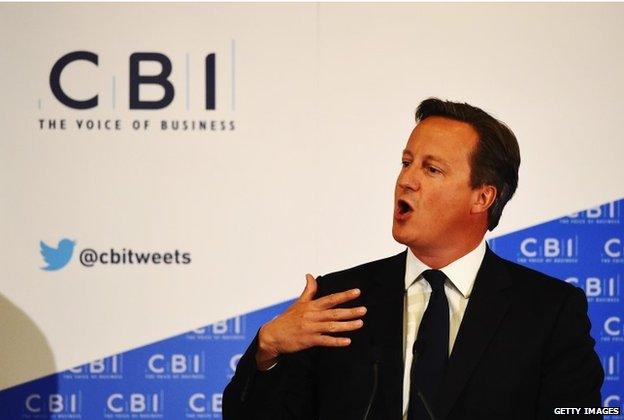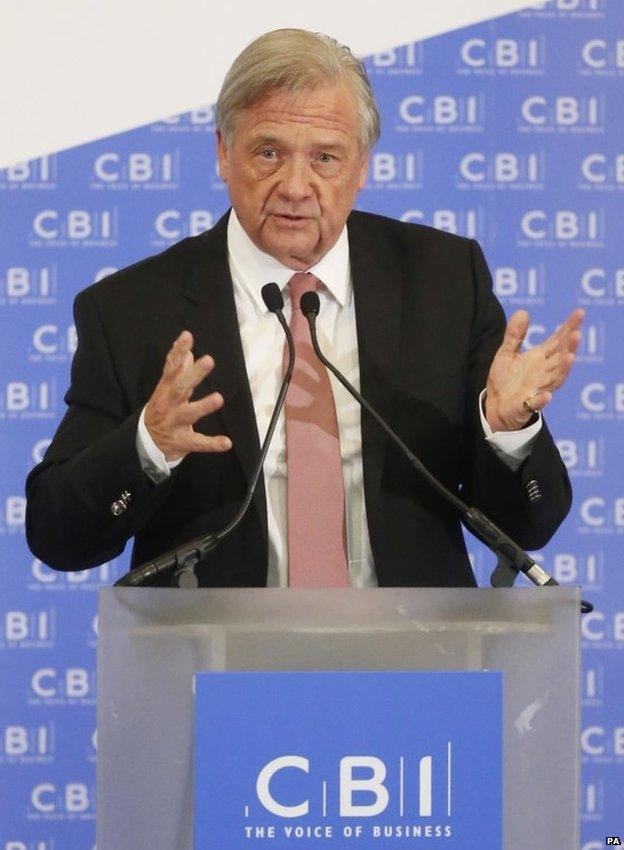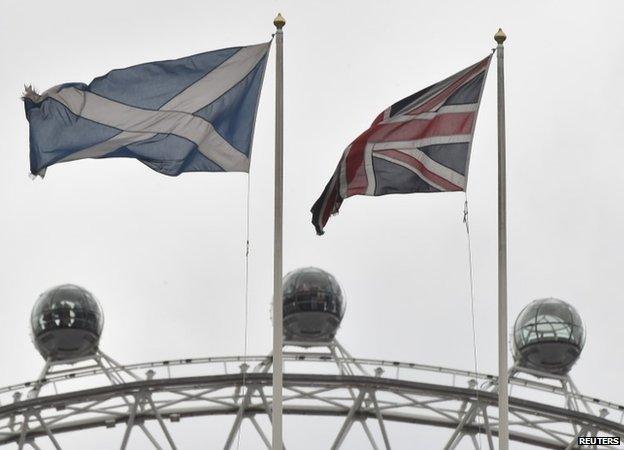Scottish independence: Putting the knife in
- Published

David Cameron spoke at the CBI dinner in Glasgow
It could have been Alex Salmond talking.
I see no evidence, said the leader on the platform, that business investment has been deterred by this forthcoming referendum. Quite the reverse.
The leader added that it was entirely right that a major constitutional change should be tested via a popular plebiscite. The people alone should determine the future governance of the nation.
These comments came in response to a complaint from the business sector that the very fact of the referendum on the horizon was causing instability and uncertainty.
Except this wasn't Alex Salmond. As the astute among my readers (that would be 100%) have already spotted, this is a reference to the prime minister and his address to the CBI Scotland dinner last night.
As billed here previously, this was a scaled-down event in response to the exigencies of the Electoral Commission. So it was business suit, not black tie.
The audience was between a quarter to a third the customary size. No flowers on the tables.

Sir Mike Rake said the prospect of a vote on EU membership was causing business uncertainty
But there was substance aplenty amid the enforced parsimony.
Firstly, we had a straightforward pitch to the business audience - and thus wider Scotland - to the effect that independence involved too much uncertainty and would shed the scope and scale of the UK market in the bygoing.
We had a modest dose of passion from the PM - a personal appeal for togetherness right at the close, with references to his Scottish, Welsh and English heritage.
Customarily, David Cameron doesn't emote. No repetition of John Major appealing for flexibility over the EU: "Like me or loathe me, don't bind my hands".
Or indeed Sir John's comparably passionate appeals over the United Kingdom.
But Mr Cameron came close last night in his final remarks after taking questions - including one which dealt with the divisions which the interlocutor feared, post referendum.
Thirdly, we had the introductory speech.

David Cameron sought to draw issues of Scottish independence and the EU together
Sir Mike Rake, CBI president, praised the prime minister warmly, spoke with enthusiasm of economic recovery. Then he inserted the knife (borrowed from the kitchen, they were very rare on the tables.)
Business, he said, was already experiencing uncertainty as a consequence of the prime minister's promise to hold an in/out referendum on Britain's membership of the EU, if returned at the next UK General Election in 2015.
Happy, he was not.
Supporters of independence, of course, instantly spotted a parallel with comparable claims made about the very fact of a referendum on Scottish independence.
The biter, they reckoned, bit.
In responding, David Cameron rather deftly contrived to conflate the two. It was wrong, he argued, simply to ignore significant divisions of opinion within the body politic. It was wrong to seek to deflect and deflate them.
It had been right, he argued, to confront the particular challenge of independence which arose directly upon the election of a majority SNP government at Holyrood.
Similarly, it was right to address the sustained and persistent difference of opinion over Britain's relations with the European Union.
He did not, in the latter case, cite the specific genesis: the rise of a Eurosceptic or, more accurately, hostile party in UKIP.
Frankness goes only so far - especially with a by-election pending.
But he did draw the two cases together in a fashion which may prove intriguing, to a degree, for the remainder of this campaign.